There is a make-or-break financial fork in the road ahead for the United States: there are only three options:
1. Slash trillions of dollars in annual federal spending to align with current tax revenues.
2. Raise trillions in additional tax revenue from the only entities able to pay more, corporations and the top 5%
3. Monetize the soaring federal debt by the central bank "printing money" and using this new money to buy Treasury bonds, as issuing new Treasury bonds for sale is the way the federal government funds its stupendous deficit spending.
One approach might be to do some of each, but there are political obstacles to any rational response to unsustainable federal debt expansion. Any cuts in spending large enough to be consequential will slash-and-burn either the cash overflowing in the federal trough that politically powerful cartels are gorging on, or entitlements that buy the complicity / passivity of the general populace. Neither is politically viable.
Those who can afford to pay more taxes--corporations and the top 5%--are (surprise) the most politically powerful groups in the nation, and they will never accede to tax increases high enough to be consequential.
Politically, the only viable option is the politically painless one of monetizing the soaring federal debt via the Federal Reserve creating $2 trillion a year with a few keystrokes and using this $2 trillion to buy virtually all the newly issued Treasury bonds.
If private owners of existing Treasury debt find the yield they're receiving doesn't even keep up with inflation, they will sell their Treasuries, forcing the Fed to print additional trillions every year to monetize portions of the existing $30 trillion in debt.
Recall that a significant percentage of state and local government spending is funded by the issuance of municipal bonds. This other governmental debt competes with Treasury issued bonds for scarce private capital. Other nations' bonds are also competitors for private capital.
Since capital flows to the highest and lowest-risk yields, yields have to rise to attract private capital. This creates another problem: as yields rise, so does the interest paid on the entire portfolio of bonds.
Higher interest payments then pressure other government spending. The politically painless solution is to monetize not just the newly issued debt but the rising interest payments due on the soaring debt.
Monetizing government debt is what I call the perpetual money motion machine. Just create another trillion to buy newly issued bonds, an additional trillion to pay higher interest and more trillions to buy up old debt that private owners are selling.
Is there anything that could break the perpetual money motion machine? Those pointing to Japan's deflationary stagflation of the past 30+ years claim there are no impediments to ever-greater monetization. The Federal Reserve can expand its balance sheet by $10 trillion or $50 trillion without any structural problems arising.
Interesting, that $50 trillion number. That's the amount that the top 5% skimmed from labor in the past 45 years. The Bill for America's $50 Trillion Gluttony of Inequality Is Overdue (September 21, 2020)
Trends in Income From 1975 to 2018 (RAND Corporation)
The Top 1% of Americans Have Taken $50 Trillion From the Bottom 90% -- And That's Made the U.S. Less Secure (Time.com)
Setting aside the political veto of the wealthiest corporate interests and households, clawing back this $50 trillion via higher taxes on those who gained the $50 trillion would be karmic justice and present fewer risks that the insane scheme of just "printing more money" to satisfy every cartel, entrenched interest and entitlement.
Let's ask a simple question of history: if monetizing debt works so wondrously, why hasn't it been the go-to solution for every free-spending government? In the good old days, creating money out of thin air was accomplished by replacing the silver or gold in coins with lead or other base metals.
Alas, people catch on to this devaluation of money, and inflation skyrockets accordingly. Proponents of adding $50 trillion to the Fed's balance sheet (i.e. monetizing the soaring debt and interest payments) claim this hocus-pocus won't spark inflation. But since all that newly issued currency enters the economy one way or another, how can it not generate inflation?
The status quo answer is: if it only inflates assets owned by the wealthy, that inflation is really rather grand. But suppose inflation leaks into Cheetos instead of Big Tech stocks? Since "We can't eat iPhones," that eventually matters.
In other words, there is a governor built into the perpetual money motion machine: real-world inflation. There is also a social governor built into the "painless" expansion of asset bubbles that favor the already-wealthy: eventually this systemic inequality distorts and destabilizes the social and economic order.
This in one reason why history shows government debt in excess of 100% of GDP (the real economy) eventually leads to disorder, default and bankruptcy. Or revolution. Take your pick. (Chart courtesy of David Sommers.)
If $50 trillion were clawed back from the wealthiest corporations and households, that would only return total assets owned by the wealthy to levels that were considered excessive a decade ago. But since this is politically unviable, the "painless" option of monetizing debt will be pursued.
But since the only possible outcomes of this option are disorder, insolvency or revolution, the wealthy may well regret their short-sighted greed. Nemesis can take various forms, but eventually the pendulum swings from one extreme (monetary hocus-pocus and staggering inequality) to the other extreme (clawback of central-bank-bubble "wealth" and a balance of revenues and expenditures).
The meteor that will obliterate the financial hocus-pocus is already visible and cannot be diverted by dancing the humba-humba and waving dead chickens around the campfire, i.e. Federal Reserve policies. Claiming god-like powers doesn't grant one god-like powers.
There's no going back once we select a pathway. The systemic damage cannot be reversed, regardless of what happy stories are told around the campfire by credulous believers in the magical powers of waving dead chickens around. We either make the future or break the future, so choose wisely.
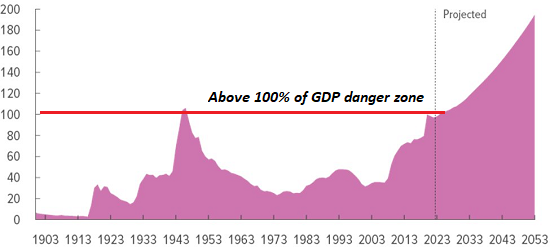
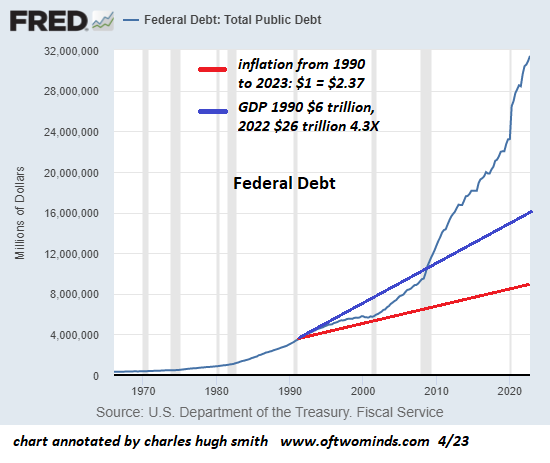
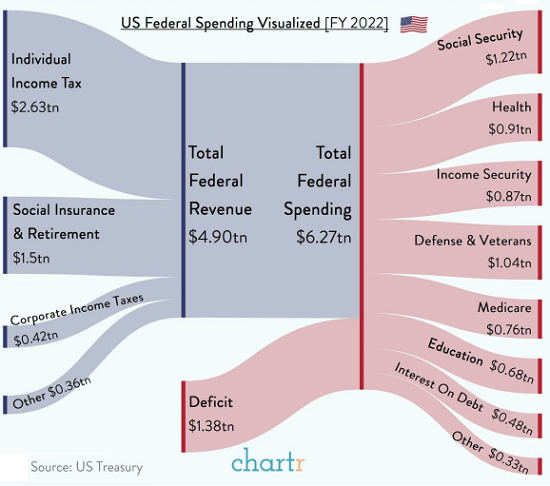
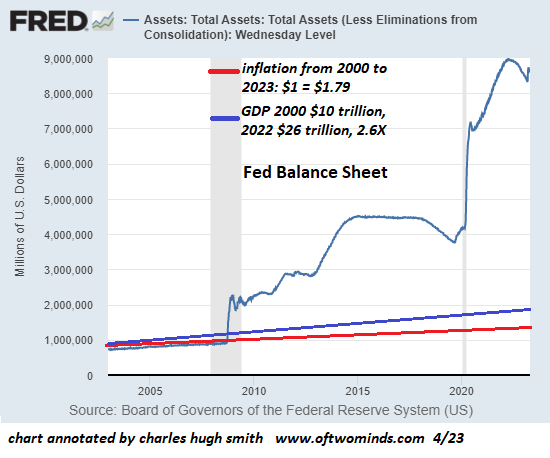
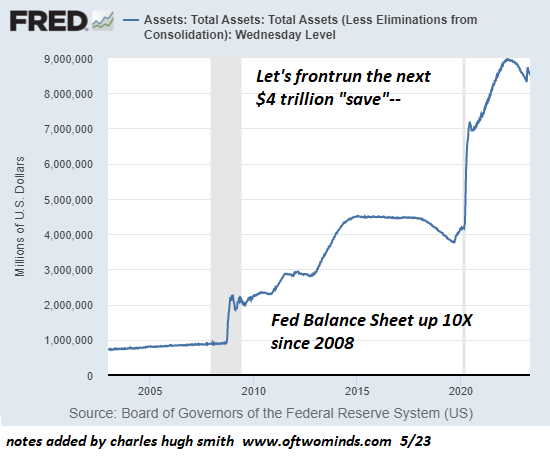

 My new book is now available at a 10% discount ($8.95 ebook, $18 print):
Self-Reliance in the 21st Century.
My new book is now available at a 10% discount ($8.95 ebook, $18 print):
Self-Reliance in the 21st Century.
Read the first chapter for free (PDF)
Read excerpts of all three chapters
Podcast with Richard Bonugli: Self Reliance in the 21st Century (43 min)
My recent books:
The Asian Heroine Who Seduced Me
(Novel) print $10.95,
Kindle $6.95
Read an excerpt for free (PDF)
When You Can't Go On: Burnout, Reckoning and Renewal
$18 print, $8.95 Kindle ebook;
audiobook
Read the first section for free (PDF)
Global Crisis, National Renewal: A (Revolutionary) Grand Strategy for the United States
(Kindle $9.95, print $24, audiobook)
Read Chapter One for free (PDF).
A Hacker's Teleology: Sharing the Wealth of Our Shrinking Planet
(Kindle $8.95, print $20,
audiobook $17.46)
Read the first section for free (PDF).
Will You Be Richer or Poorer?: Profit, Power, and AI in a Traumatized World
(Kindle $5, print $10, audiobook)
Read the first section for free (PDF).
The Adventures of the Consulting Philosopher: The Disappearance of Drake (Novel)
$4.95 Kindle, $10.95 print);
read the first chapters
for free (PDF)
Money and Work Unchained $6.95 Kindle, $15 print)
Read the first section for free
Become
a $1/month patron of my work via patreon.com.
Subscribe to my Substack for free
NOTE: Contributions/subscriptions are acknowledged in the order received. Your name and email remain confidential and will not be given to any other individual, company or agency.
|
Thank you, newbs3247 ($50), for your splendidly generous Substack subscription to this site -- I am greatly honored by your support and readership. |
Thank you, starucca ($5/month), for your superbly generous Substack subscription to this site -- I am greatly honored by your support and readership. |
|
Thank you, bpodkulski ($5/month), for your superbly generous Substack subscription to this site -- I am greatly honored by your support and readership. |
Thank you, mcbride ($50), for your outstandingly generous Substack subscription to this site -- I am greatly honored by your support and readership. |
